Independent Contractor vs. Sole Proprietor
Did you know that independent contractors in the U.S. form somewhere between 6.9% to 9.6% of the overall workforce? If these figures are to be believed, independent contractors consist of between 10.5 million and 15 million workers in the U.S. alone.
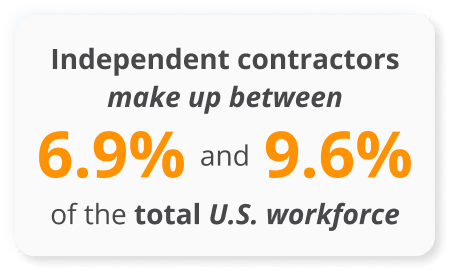
An independent contractor, also known as a freelancer, is a person who works for another entity but not as an employee. They provide services to individual clients or organizations and receive payment usually on a per-project, per-task, or per-day basis, as well as the type and amount of work they do as mentioned in their contract’s terms.
A sole proprietor, also termed as self-employed, is a single person who runs a small business and is responsible for all the outcomes of the business. Self-employed business owners are people who do have an income from the product or services they sell but do not register their business with their respective states.
Many people, as they start working, find it difficult to figure out if they work as an independent contractor or a sole proprietor. Since both the terms are used interchangeably, they are different in terms of business structure.
| Sole Proprietor | Independent Contractor |
| A one-person business that is not registered with the state or any business establishment. | A self-employed individual is hired by another business entity for a specific task or service. |
In this article, we will discuss these two terms in detail to understand how they are different and how they conflate.
What Is a Sole Proprietor?
A sole proprietor is a person who runs the business alone and is liable for all kinds of outcomes. It is a self-employed individual who owns a business that is not registered with the state or federal government, or any legal entity.
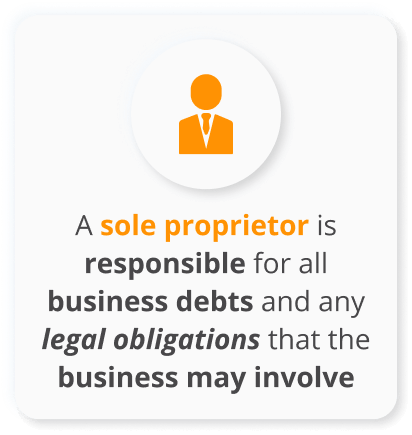
The person is responsible for all business debts and any legal obligations that the business may involve. They operate their own business and do not work in a setup where the employer pays the salary or regular wages.
In addition, sole proprietors are liable to pay the business taxes or self-employment taxes, which are usually 15.3% of the net earnings, split into 2.9% for Medicare taxes and 12.4% for Social Security.
Benefits of Sole Proprietorships
Since you operate your own business, you have complete control over your business decisions without having to answer to anyone. It is the easiest business structure that is least expensive to establish.
Under a sole proprietorship, an individual can enjoy the flexibility of filing taxes (business and personal) on a single return while saving a considerable amount of money.
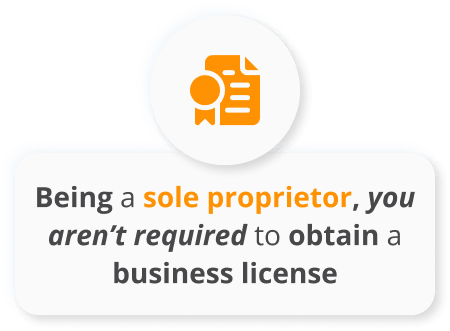
Tax reporting requirements, similar to most small business owners, are easy to fulfill and tax rates are comparatively lower than other business structures.
Being a sole proprietor, you aren’t required to obtain a business license (unless it’s mandatory for the type of services you offer). No registration with the state or federal government is required, unlike a limited liability company, where registration is mandatory.
Taxes for Sole Proprietorships
In the sole proprietorship model, the individual needs to pay self-employment taxes through tax form 1040 Schedule C, Profit and Loss from Business, which is meant to report income and losses from the profession you practice or the business you operate as a sole proprietor.
All your business income, costs for your goods sold, personal finances, and costs for home-based business are calculated to determine the amount of taxable business income (net income) to file an income tax return.
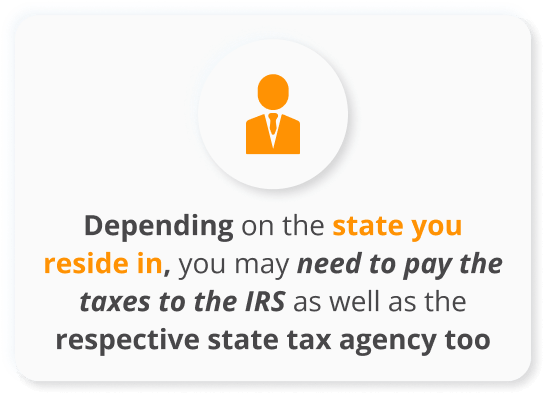
A sole proprietor is not an employee, and hence as per IRS guidelines, they must pay the estimated taxes throughout the year; rather than paying them all at the end of the year. If you have employees, you need to pay and report FICA taxes that include Social Security and Medicare.
One must pay their income tax each quarter i.e., 15th April, 15th June, 15th September, and 15th January in a particular financial year. Depending on the state you reside in, you may need to pay the taxes to the IRS as well as the respective state tax agency too.
Liability Insurance Need?
Similar to any other business model, sole proprietors are also prone to business litigations, bankruptcy proceedings, and debt collection. Hence, sole proprietors must be fully insured to protect their business and personal assets against lawsuits, injuries, car accidents, and other similar incidents.

As a sole proprietor, you are not likely to hire employees, but you must still purchase workers’ compensation insurance to protect you against workplace injuries and accidents.
General contractors’ insurance and errors and omissions insurance must be included in your business risk management plan to secure your business against the most common liabilities.
What Is an Independent Contractor?
An independent contractor is a self-employed person who delivers a specialized service rather than a product (in most cases) to clients or corporations, but not as an employee. They receive payments based on the type of work they do.
Before starting any project, the self-employed individuals usually sign a contract with the client or business entity. The contract that is signed between the independent contractor and the client usually includes the scope of work, deadlines, payments terms, and other similar information.
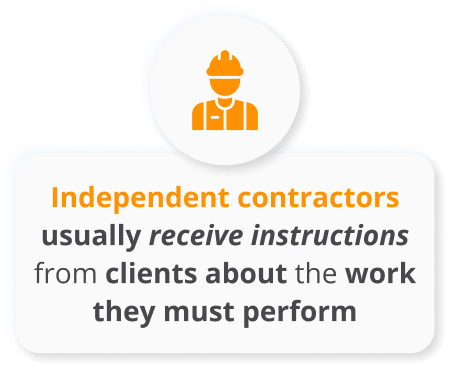
Independent contractors usually get instructions from the client on the type of work they need to do. However, they can control how and when they may do it with no implication, guidelines, or influence from the clients.
Benefits of Independent Contracting
Being an independent contractor means having the flexibility to work under a self-regulated schedule and guidelines. You are in charge of the workload and can decide your work hours.
The IRS requires independent contractors to report self-employment taxes on a quarterly basis. Their taxes usually include social security tax and Medicare tax.
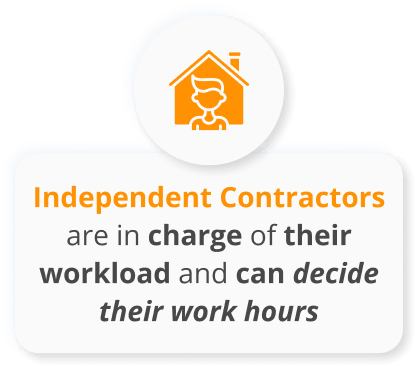
Unlike typical employee income, your income as an independent contractor doesn’t come in the form of paychecks and so nothing needs to be withheld for payroll taxes.
Instead, your taxes as an independent contractor are imposed on your net income, which are your earnings minus expenditure. So, you get the flexibility to deduct your business expenses such as internet and office bills, meals and travel expenses, and other costs of operating your business.
Taxes for Independent Contractors
Being an independent contractor, you are responsible for managing your own taxes and filing your personal tax return. You must estimate tax payments quarterly throughout the year by filling in the tax form 1099-MISC only if you earn over $600 from an individual client.
If you earn less than $600 from a client, you are not required to fill up a 1099-MISC form, but Schedule C.

The personal income tax must be filed on or before 15th April each year by filling in Form 1040 Schedule SE, Self Employment Tax.
The quarterly estimated tax deadlines are 15 April, 15 June, 15 September, and 15 January of the tax year.
Liability Insurance Needed?
People who are classified as independent contractors can get health insurance. Usually, they are required to buy their own insurance policy from a private insurer, based on the type of business they operate.
Depending on your income as an independent contractor, you might be eligible for Medicaid coverage through the state. However, this insurance plan mostly covers people with low-income groups.
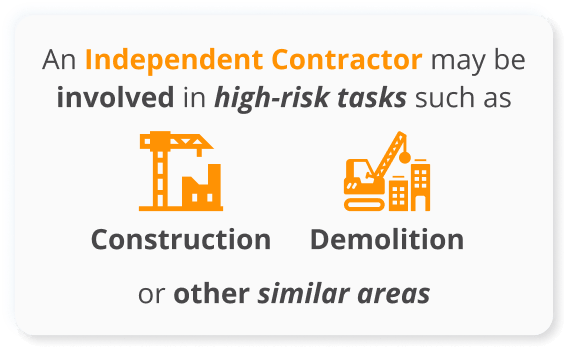
An independent contractor may be involved in high-risk tasks such as construction, demolition, or other similar areas. If so, you might need to have worker’s compensation insurance as it is a mandatory requirement for acquiring a project from a client or organization in many states.
Insure Your Small Business through Contractors Liability
If you enter a contract before starting your work at a particular site, then the chances are you are an independent contractor who delivers specific expertise to clients and businesses. On the other hand, if you are more likely to sell a product that you have developed to another business, you are a sole proprietor.
| Sole Proprietors | Independent Contractors | |
| Definition | An individual who runs an unincorporated business under a single ownership model and offers a product to other businesses | A self-employed person who offers some specialized services to the clients under contractual terms and not as a full-time employee |
| Benefits | No business registration required Less cost of operation Self-employment taxes on net incomeFlexible working termsNo business license required | No business setup required Higher pay rates Personal income tax on net incomeFull control over working hours No license required |
| Taxes | Form 1040 Schedule CSelf employment tax Estimated taxes Federal and State taxes | Form 1099-MISC Self-employment tax Income tax Federal and State taxes Municipal taxes |
| Insurance | Worker’s compensation insurance General contractors insurance | Worker’s compensation insurance Health insurance |
If you are a sole proprietor or an independent contractor working with multiple business clients, Contractors Liability can help you with all your insurance requirements.
We house a team of expert insurance agents who can help you understand what insurance policy is best for your business model and help you pick the right one.

